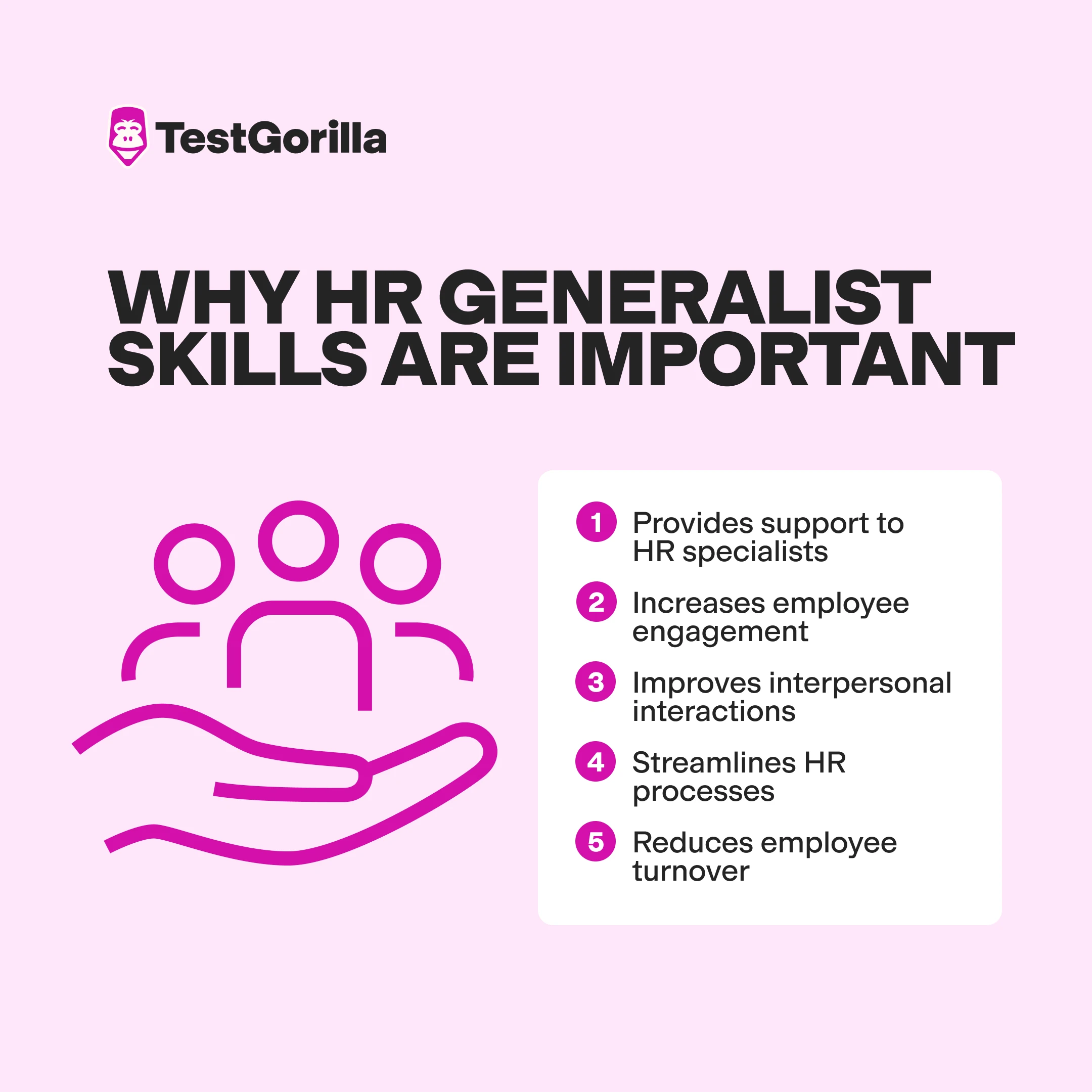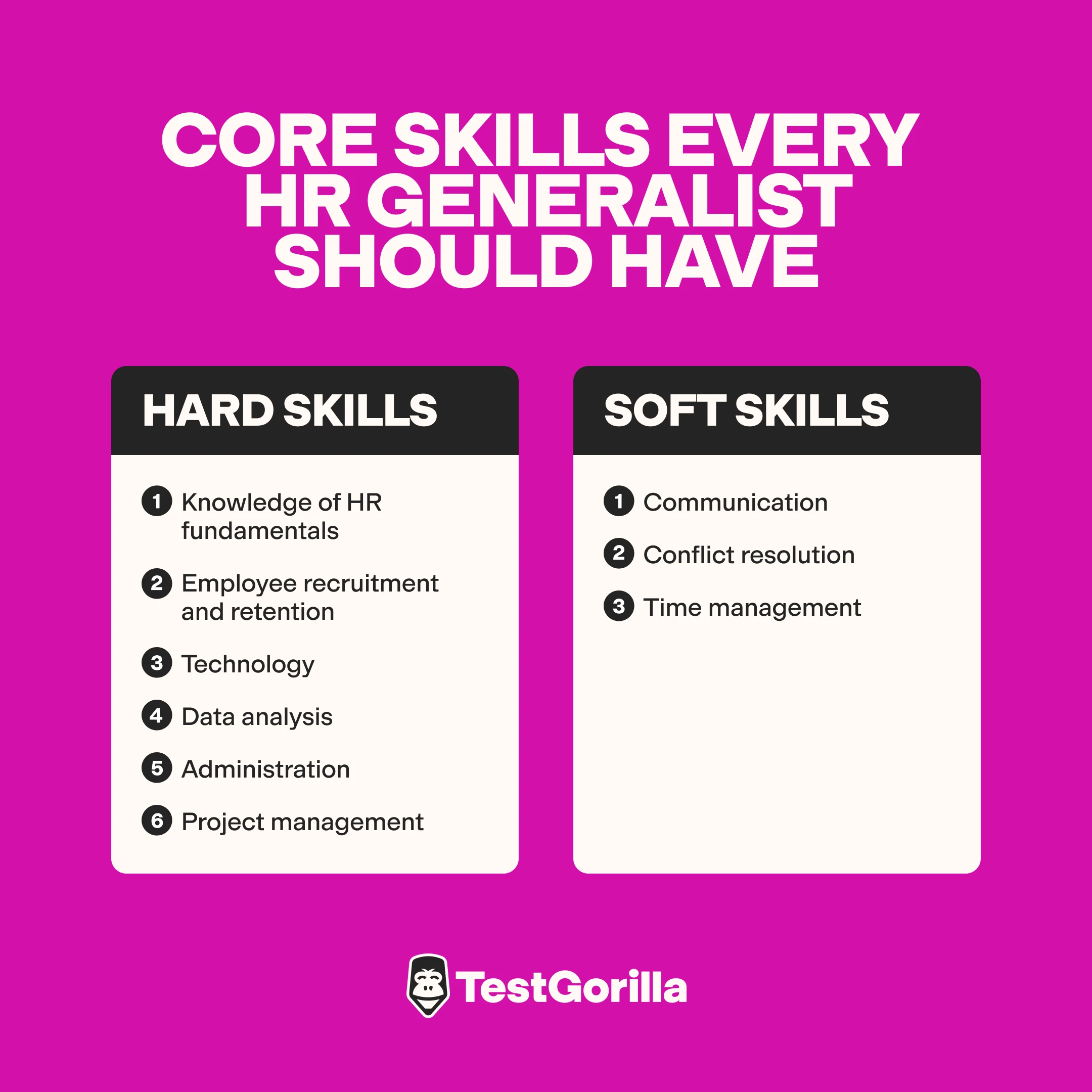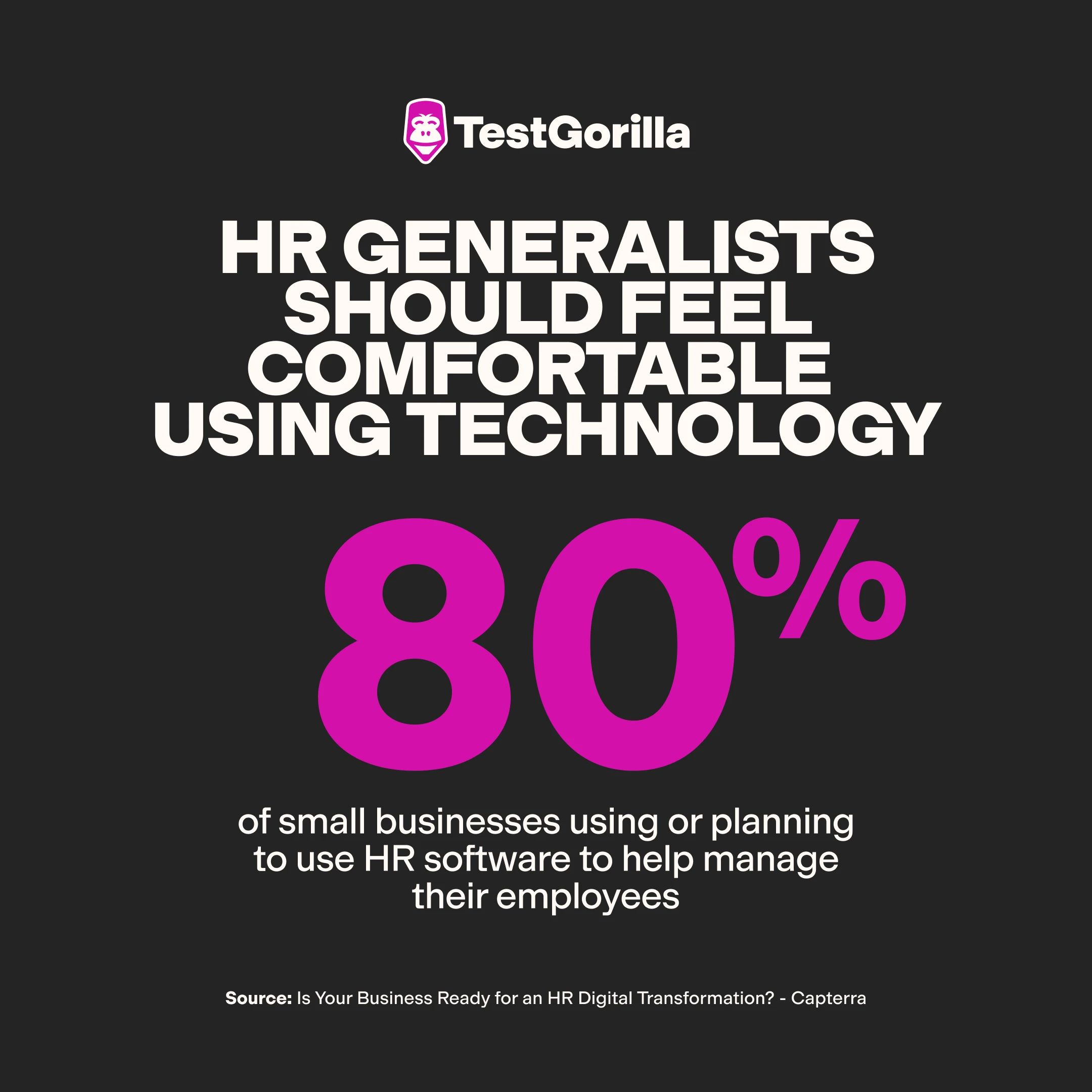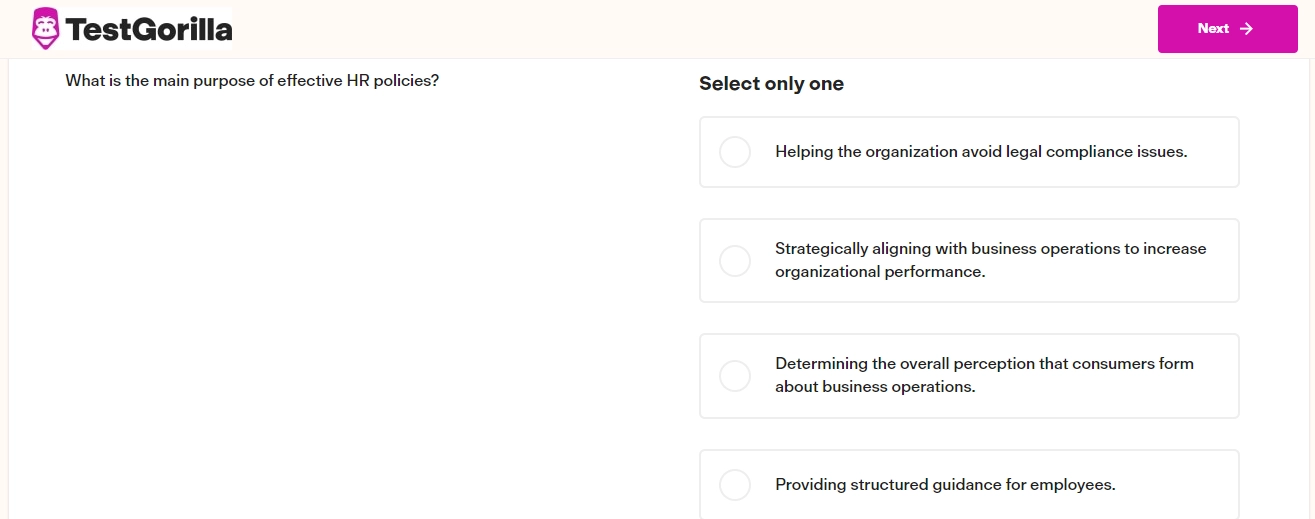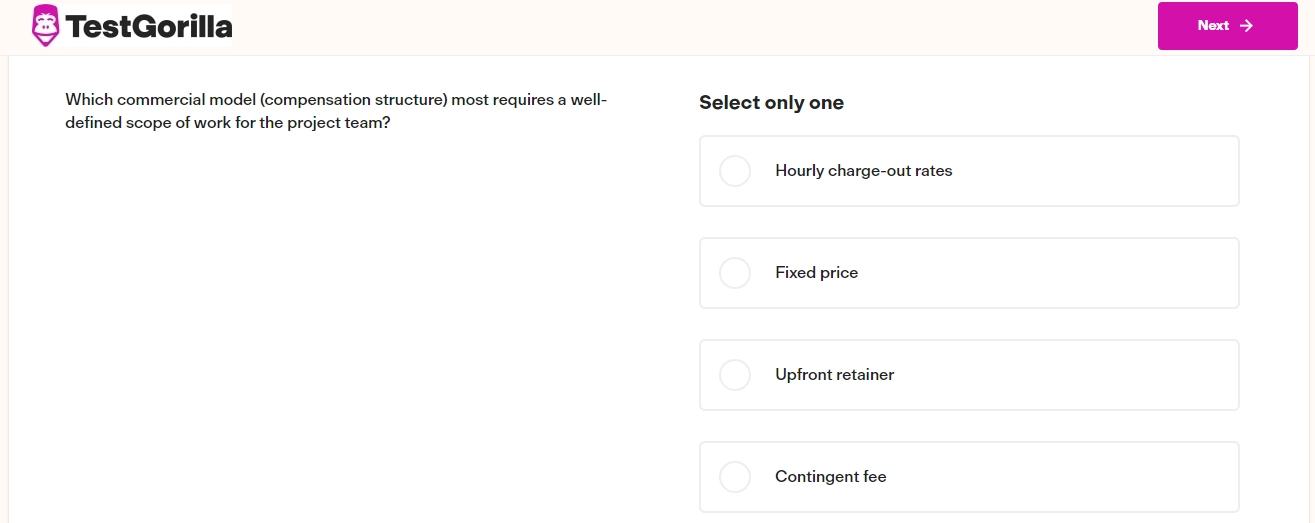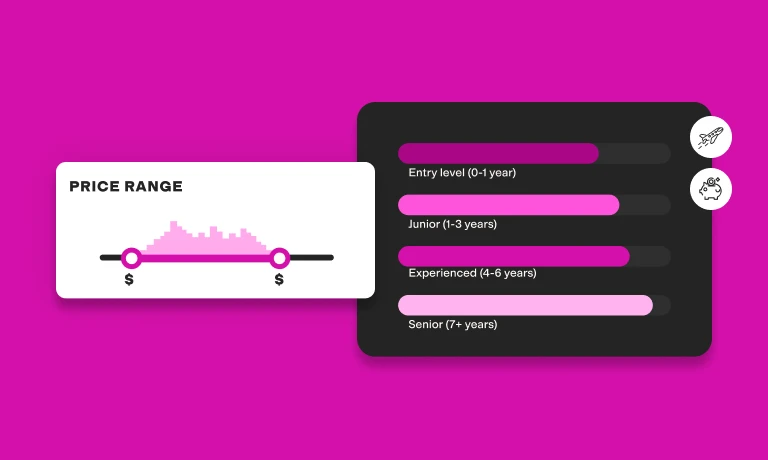Find the best HR generalist for the job with talent assessments.
Human resources generalists are in high demand, ranking in the top 30% of the most sought-after HR positions, according to research. However, filling this role can be challenging.
It’s hard to determine if a candidate has the right mix of HR generalist skills from an interview alone.
Fortunately, evaluating your candidate pool can be made easy with a few pre-employment tests by your side.
In this article, we explore why having a suitable HR generalist skill set is so important, what those skills are, and how you can assess them effectively when recruiting a new hire.
Table of contents
- Why are HR generalist skills important?
- 9 key HR generalist skills and competencies
- How to assess skills for human resources generalists
- Summary: The 9 top HR generalist skills and how to test for them
- How to develop human resources generalist skills
- Assess HR generalist skills with TestGorilla to hire the best candidate
- HR generalist skills FAQs
- What is an HR generalist skills assessment?
Why are HR generalist skills important?
Since HR generalists often dominate large HR departments, having the right skill set is more important than certificates and critical to making the whole operation run smoothly. Here are five main reasons these skills are essential for your business and employees.
1. Provide support to HR specialists
Hiring a candidate with a broad range of human resources generalist skills can help support your HR specialists and teams across various tasks. Freeing up the specialists’ time like this gives your HR department flexibility in how it functions.
For instance, let’s say you have an HR specialist in the process of revamping your compensation and benefits program, taking time away from their regular duties. In this case, an HR generalist can often pick up the slack by administering the benefits programs and handling other routine tasks in the department.
2. Increase employee engagement
With employee engagement at an 11-year low, finding an HR generalist who can bring something to the table here is essential. Take goal-setting skills, for example. Goal-setting skills enable HR generalists to teach employees to set achievable goals, ensuring teams stay engaged and focused on progression.
Here, an HR generalist skilled in employee engagement may help employees set goals using the SMART strategy.
SMART stands for:
Strategic
Measurable
Achievable
Realistic
Timely
A structured approach to goal-setting can help show employees that the company cares about their development, improving employees' connection to the workplace.
3. Improve interpersonal interactions
Communication skills ensure HR generalists can handle interactions with job seekers, employees, and managers. With verbal and non-verbal communication skills, HR generalists can collaborate and resolve issues with these individuals no matter where they fit into the business.
For example, let’s say a manager is having trouble with an employee’s attendance, and attempts to resolve the issue themselves are going nowhere. A human resource professional can step in, listen to both sides of the problem, and use problem-solving and interpersonal skills to develop an action plan that benefits both parties.
4. Streamline HR processes
Although experienced HR generalists may have some manual time-saving tips and tricks, technology skills can often help them complete HR processes faster. Expertise in using tech like human resources information systems (HRIS) and applicant tracking software (ATS) can help them automate manual duties and improve efficiency in the department.
With technical skills, HR generalists can streamline tasks like:
Resume scanning
Managing candidates
Automating relevant HR tasks gives them more time to dedicate to hands-on duties, like writing job descriptions and supporting diversity, equity, and inclusion (DEI) initiatives. With most US workers in favor of DEI programs, any extra time that HR generalists can spend on them is worth it.
5. Reduce employee turnover
Finally, human resources generalist skills in onboarding and training help HR generalists reduce employee turnover. These skills are vital in helping them ensure new hires integrate well into your organization and create a good work environment.
For example, HR generalists can work with hiring managers to plan and refine staffing and onboarding processes by collecting feedback from applicants and new employees, leading to more successful hiring outcomes.
9 key HR generalist skills and competencies
Although HR generalists can benefit from various skills, some are more important to the department than others.
Here is a summary of some top in-demand hard and soft skills for an HR generalist job.
Hard Skills | Soft Skills |
Knowledge of HR fundamentals | Communication |
Employee recruitment and retention | Conflict resolution |
Technology | Time management |
Data analysis | |
Administration | |
Project management |
1. Knowledge of HR fundamentals
A critical HR generalist interview question you should ask is about their experience and knowledge of HR fundamentals. The job may often be entry-level, but a candidate with background knowledge can help them integrate into the position faster.
A candidate with knowledge of HR fundamentals often has:
Knowledge of human resources management and industrial or organizational psychology programs
An understanding of core HR responsibilities, like hiring, training, and performance evaluation
Knowledge of current employment laws at federal, state, and local levels
For example, an HR generalist with a good understanding of employment laws can help mitigate legal risks for all stakeholders.
2. Employee recruitment and retention
With 58% of HR leaders reporting that selecting and retaining talent is one of their biggest challenges, implementing effective employee recruitment processes and retention strategies are essential skills for a human resources generalist.
Potential candidates should have skills in:
Finding and selecting the top candidates and seeing if they’re a match for the company culture and manager
Onboarding
Employee experience to help attract and retain talent
For example, a skilled generalist may create onboarding checklists to help successfully integrate new hires into the workplace and reduce turnover.
3. Technology
Command of technology has become a must for an HR generalist’s skill set. With 80% of small businesses using or planning to use HR software to help manage their employees, generalists should feel comfortable using technology.
Of course, it depends on what you’re using at your company, but an HR generalist with technology skills should have some knowledge of:
HRIS software
ATS
How to best use AI in HR
For example, ATS technology helps with job posts, looking at resumes, and keeping data on potential hires.
4. Data analysis
More than 90% of HR professionals consider using people analytics to drive their strategy, so skills in data analysis are becoming essential to an HR generalist’s skill set.
Analytical skills involve deconstructing information and evaluating it to draw conclusions.
Some specific skills in this area include:
Looking at and using metrics
Using data to make decisions
Paying attention to detail
An HR generalist might use their analytical skills to narrow a candidate pool. For example, Nexus HR uses data from talent assessments to choose between highly qualified candidates, improving the quality of hires.
5. Communication
It may be one of the most important HR manager skills, but effective communication is also key for HR generalists during their day-to-day interactions. As the link between employees and the business, an HR generalist must know how to tailor their message to the audience.
A skilled HR generalist must communicate effectively in different ways, whether it’s:
Written or verbal
Formal or informal
In-person, over the phone, and online
For example, a formal approach may be better for dealing with upper management, while employees may appreciate more informal communication.
6. Administration
Though technology is changing how HR generalists approach things, administrative skills remain a major part of their role. Keeping track of important information across departments keeps everything running smoothly.
Administrative skills that top HR generalists excel in include:
Creating and filing physical documents when necessary
Updating databases daily for routine tasks
Handing employee leave, absences, payroll, etc.
For example, an HR generalist may maintain HRIS systems for everything from payroll to employee benefits. An up-to-date HRIS system makes it easy for everyone to access the information they need.
7. Conflict resolution
An extension of communication, conflict resolution skills include diffusing tension and enhancing employee relationships. They also involve:
Mediating disagreements
Creating inclusive company policies
Training employees to use conflict resolution methods
The HR generalist you hire should be able to use conflict resolution skills to resolve disputes such as task-related disagreements. They can use these skills in mediation by asking open-ended questions and being empathetic, which helps employees feel more comfortable sharing their concerns.
8. Project management
Since HR generalists often work on several projects simultaneously, project management skills are helpful in this position. They can help them organize their workload to ensure each project is on schedule.
Project management skills include the following:
Project budget estimation
Organizational skills
Talent management
Communication during the entire project lifecycle
Team project and schedule management
For example, an HR generalist might be in charge of planning a company retreat in addition to their typical responsibilities. In this case, they would use their project management skills to estimate the retreat budget, communicate with the company to provide all the pertinent information, and organize it from start to finish.
Since they work on multiple tasks at once, support various HR teams, and need to reassess priorities regularly, HR generalists should be well-versed in managing themselves and their time effectively.
9. Time management
Time management involves completing work to agreed-upon deadlines and managing tasks efficiently. Some specific abilities that are crucial for time management include:
Task prioritization
Strategy planning and adaptability to complete challenges
Reflecting on the task results to optimize processes
HR generalists can use time management skills to achieve things like juggling recruitment, onboarding, and candidate sourcing. They should consider how long these tasks take and allot specific time for each. This skill helps them stay productive and achieve each hiring task while reducing time-to-hire metrics.
The best insights on HR and recruitment, delivered to your inbox.
Biweekly updates. No spam. Unsubscribe any time.
How to assess skills for human resources generalists
We have a broad range of skills and traits tests available in our test library that you can use to create an assessment and start benefiting from skills-based hiring.
Read on for the list of tests we recommend considering when you use decision-making to make your HR generalist assessment.
Assess HR generalist skills quickly and accurately with TestGorilla
With TestGorilla's wide variety of talent assessments, you can test for important skills for HR generalists and beyond. Sign up for a Free forever account to streamline your hiring process today.
1. HR Fundamentals test
The HR fundamentals skills test assesses the core HR knowledge and abilities you would expect from a skilled HR generalist. It is one of the most important tests to help distinguish the most qualified candidates.
Since they can play so many different roles in the department, this test touches on a range of HR generalist knowledge and skills:
HR expertise, including knowledge of the roles and responsibilities of an HR generalist and others in the department.
HR business acumen, such as how well they can understand and handle business situations and identifying the first step in helping managers hire new candidates.
Consultation and guidance to everyone, regardless of where they fall in the organization.
Relationship management, which helps ensure that everyone works well together toward the same goal.
This test is a great choice to help you identify the candidates with the right HR competencies to contribute to the overall success of the company by using questions like the one below:
2. Talent Acquisition test
Although the duties of an HR generalist position vary from one company to another, helping recruit new staff is common. The Talent Acquisition test can come in handy here, as it covers human resource generalist skills such as:
Identifying and attracting potential candidates
Creating a positive candidate experience
Interpreting recruitment analytics to make data-driven decisions
Onboarding new hires effectively
A candidate who scores high on this test can help reduce time-to-hire and increase employee retention rates, ensuring that your organization always has enough staff to achieve its goals.
By saving time on hiring resources, HR assessments like the Talent Acquisition test can save money and improve your recruitment return on investment (ROI).
See the difference skills-based recruiting makes with TestGorilla assessments.
With TestGorilla’s predeveloped talent assessments, you can ensure that you’re evaluating a candidate’s skills effectively by making data-driven decisions. See how it works by signing up for a live demo.
3. Attention to Detail test
Our Attention to Detail test checks if candidates can complete complex processes with analytical skills.
Use this test to validate candidate skills for the following:
Information filtering
Skills in comparing statements and information
Ability to check the consistency of information
The Attention to Detail test is an excellent tool to determine if your candidates can keep track of the minor details when completing HR responsibilities for your company.
4. Project Management test
The Project Management test helps identify a candidate’s ability to manage projects contributing to an organization’s business goals. It covers HR generalist skills such as:
Estimating, managing, and limiting the risks on project budgets and schedules
Communication throughout a project’s lifecycle
Knowing what high-quality project work looks like and delivering and managing it effectively
Use this test to learn which candidates can help you boost productivity and morale during projects with questions like:
5. Communication Skills test
The Communication Skills test assesses your candidates’ verbal and non-verbal communication competencies. It specifically looks into their ability to:
Understand written communication
Use active listening
Use professional etiquette when sharing information.
Summarize messages
Choose this test as part of your assessment if you need to know whether candidates can be attentive when listening to others, communicate effectively in writing, and use grammatically correct information in written documents.
Summary: The 9 top HR generalist skills and how to test for them
Top HR skill | How to assess it |
HR Generalist Skills | HR Generalist Assessment Test |
Knowledge of HR fundamentals | HR Fundamentals test |
Employee recruitment and retention | Talent Acquisition test |
Data analysis | Attention to Detail test |
Project management | Project Management test |
Communication | Communication Skills test |
Time management | Time management test |
Technology | Working With Generative AI test |
Conflict resolution | Active Listening test |
Administration | Administrative Assistant test |
How to develop human resources generalist skills
From helping a current HR generalist develop their skills to bringing in a new one, you can do a few things to help them reach their potential.
One option is to offer on-the-job training to help new hires develop their knowledge of HR functions. Opportunities like job shadowing or job rotation within the HR department enable HR generalists to learn while still providing services to your organization. If you have the time, you could even act as a mentor yourself.
On the other hand, if you prefer a more formal approach to education, you could invest in continuous learning opportunities for HR generalists. Some companies offer tuition assistance programs to help employees pay for higher education, while others pay for role-specific workshops.
No matter how you decide to go about it, the main thing is encouraging continuous learning in your HR generalists. Sometimes, a little encouragement can go a long way.
Assess HR generalist skills with TestGorilla to hire the best candidate
Finding an HR generalist with the right skill set may be essential to successful hiring, but validating candidate skills from an interview alone can be challenging.
With talent assessments like the Active Listening test from our library, you can easily separate skilled candidates from not-so-skilled ones, saving you time and money.
Try the TestGorilla demo to see how to work HR generalist assessment tests and more into your candidate screening process.
Want to create an assessment yourself? Take a product tour to learn more.
When you’re ready to take your HR candidate screening process to the next level, sign up for a Free forever plan today.
HR generalist skills FAQs
If you’d like more information on using an HR generalist assessment test in your hiring process, read our responses to frequently asked questions below.
What is the HR generalist role?
The role of an HR generalist is to handle a range of daily HR tasks depending on an organization’s needs. They help create organizational guidelines, ensure compliance with employment laws, manage compensation and benefits administration, establish performance management and training programs, provide employee support, and help with recruitment, selection, and onboarding.
What is an HR generalist skills assessment?
An HR generalist skills assessment helps you assess your candidate’s skills and experience related to the position. Whether you need a candidate with extensive knowledge of HR fundamentals or top-notch recruitment and selection skills, assessments ensure that you select candidates with the right mix of skills that align closely with the role’s requirements.
What are the qualities of an HR generalist?
Knowledge of HR roles and functions
Awareness of employment laws and compliance
Conducting interviews and keeping employee records
Recruitment, selection, and onboarding skills
Effective time management
Technological know-how, including HRIS, ATS systems, and AI
Analytical skills, including data and people analytics
Strong communication skills, both verbal and nonverbal
Administrative task expertise
Project management skills
Conflict resolution skills
Is an HR generalist higher than a manager?
No, an HR generalist isn’t higher than a manager. It’s quite the opposite – an HR generalist typically reports to the manager. HR generalists work under senior professionals like HR managers, so they handle routine HR tasks like recruitment, administrative duties, and employee relations. With these tasks taken care of, HR managers can focus on the overall direction of the HR department.
You've scrolled this far
Why not try TestGorilla for free, and see what happens when you put skills first.



